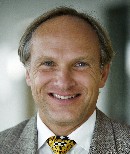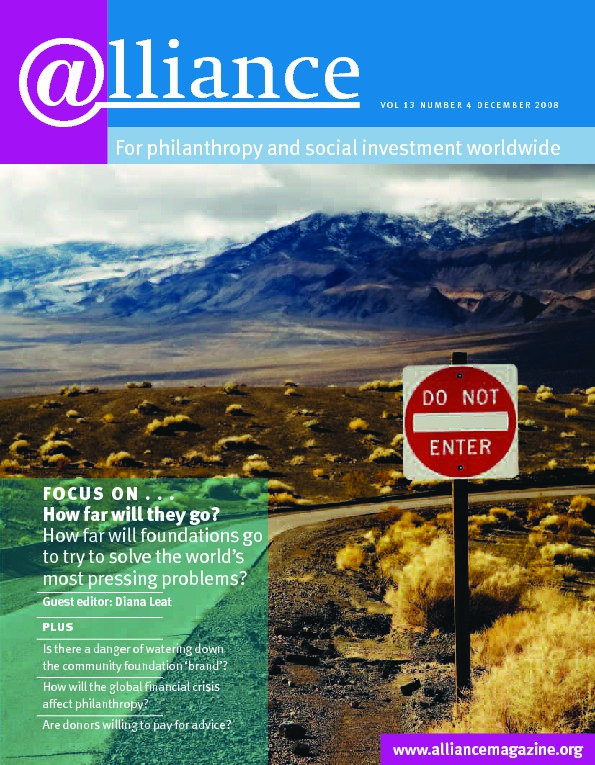 In 1997, Peter Heller and his family established the Canopus Foundation, whose support for clean energy encompasses grantmaking, social investment and networking. For Heller, it was ‘a logical way to go’. His own private equity company, set up in 1996, invests exclusively in solar, wind power and energy efficiency companies. Prior to that, he was deputy mayor for environmental protection in Freiburg. Added to this was ‘the strong entrepreneurial background of my family [the family business is printing] and the strong commitment of myself and my family members to environmental protection.’
In 1997, Peter Heller and his family established the Canopus Foundation, whose support for clean energy encompasses grantmaking, social investment and networking. For Heller, it was ‘a logical way to go’. His own private equity company, set up in 1996, invests exclusively in solar, wind power and energy efficiency companies. Prior to that, he was deputy mayor for environmental protection in Freiburg. Added to this was ‘the strong entrepreneurial background of my family [the family business is printing] and the strong commitment of myself and my family members to environmental protection.’
The foundation has two sources of revenue, Heller explains. One is the endowment, which is €5 million, the interest on which goes directly into operations. The other is his private equity company. ‘In a good year I transfer roughly 50 per cent of our net revenues into the foundation as a tax-exempt donation.’
Canopus’s ‘unique selling point in the foundation world’, says Heller, is ‘market intelligence and knowledge about how clean energy markets work’. Hence their twofold strategy: providing money to social enterprises ‘to promote business development and to finance scaling up and replication’, and technical assistance, for example helping social enterprises to re-negotiate the purchase of solar modules or wind turbines.
He continues: ‘There are entrepreneurs in countries like India, Tanzania, Brazil, Peru and Bolivia who are struggling even to get the basic material and equipment. We as a small player in the field try to build bridges between suppliers in the developed world and social enterprises in developing countries.’
Canopus also makes social investments. Identifying suitable investments has to be done very carefully, he explains, because ‘the asset management of non-profit organizations in Germany is very strictly controlled by the tax authority’. In fact, this is where the Canopus Foundation sails closest to the wind. ‘We are generally working at the limits of what German legislation allows us to do,’ says Heller.
Each German foundation goes through a monitoring process to see whether it deserves its non-profit status every three years, Heller explains. ‘So you have to be sure that your asset management policies match up to what the tax authorities interpret as safeguarding the wealth and property of the foundation.’
And if they don’t? ‘If you run into problems you could lose your not-for-profit status.’ This means starting to pay tax on your investment income. If it goes really wrong, you might have to pay tax retrospectively for the last one or two years. So you have to adopt a ‘pragmatic approach, a mix of experience and intuition’.
About 35-40 per cent of the Foundation’s endowment is currently invested in renewable energy. ‘In a good year we can make an investment on a larger scale, in our case in the €500,000 to €1 million range … If there are good projects around, I wouldn’t be afraid of going up to 50/50.’ Clean energy projects are relatively safe at the moment, which means that the German tax authorities have usually been ‘open to accept that direct investments in wind parks and solar investment funds are an acceptable part of a foundation’s portfolio’.
This could change, he concedes, ‘for example if government policy changed and no one was willing to do anything about climate change or clean energy provision’, but he doesn’t see this as likely in the next three to five years. ‘We might even see the reverse trend as a result of the follow-up process to the Kyoto protocol. We might even see ongoing government support for clean energy generation.’
In addition to making grants and social investments, Canopus is involved in networking and advocacy. ‘We’ve always felt Canopus can be an excellent bridge-builder between social enterprises in developing countries and other foundations and grant-givers.’
That’s the reason why Canopus co-founded BASE (Basel Agency for Sustainable Energy) in 2001 along with partners from France and Switzerland. BASE’s mandate for the last seven years, says Heller, has been ‘to run training seminars and conferences and to work closely with UNEP and other UN institutions to promote renewable energies’. BASE now has a working relationship with the Climate Trust in London and is managing the Sustainable Energy Finance Alliance.
By bringing together ‘on-the-ground experience with individual social enterprises in the clean energy sector’ and this international networking, he says, ‘we’ve managed to facilitate contact between international agencies and the projects we’re supporting directly.’
For more information
Contact Peter Heller at pwheller@canopusfund.org or visit http://www.canopusfund.org






Comments (0)